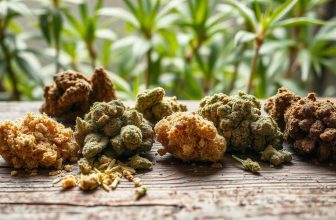The hemp industry continues to evolve, offering new advances to enhance the benefits of this well-known molecule. Among the latest innovations in cannabinoids, H4CBD stands out as a hydrogenated cannabidiol. In this article, we'll explore in detail exactly what H4CBD is and what it can bring to the field of wellness.
Key Takeaways :
Reviews of H4CBD are few and far between. Some consumers report relaxing and beneficial effects, notably in reducing stress, anxiety and pain. Others report less pronounced effects, similar to traditional CBD. Each experience is unique and depends on individual sensitivity, dosage and product quality. Mild side effects, such as headaches or drowsiness, may be observed but are rare and temporary.
What is H4-CBD? Definition
H4-CBD, also known as hydrogenated cannabidiol, is an innovative form of cannabidiol that is gaining popularity in the wellness industry. This new variation of CBD is created using a chemical modification technique called hydrogenation, which involves adding hydrogen atoms to the CBD molecule. But what does this mean in practice, and what are the potential benefits of H4-CBD?
H4-CBD is a hydrogenated form of cannabidiol. Hydrogenation is the chemical process of adding hydrogen atoms to a substance. In the case of H4-CBD, this means that hydrogen atoms are introduced into the cannabidiol molecule. This chemical modification gives rise to a new form of CBD, with distinct characteristics compared to traditional CBD.
Hydrogenated cannabidiol has potentially enhanced properties. Hydrogenation of cannabidiol can influence its properties and effects on the body. Although specific studies on H4-CBD are still underway, some research suggests that this hydrogenated form may offer increased bioavailability, meaning the body can absorb more easily and enjoy more of its potential benefits.
H4-CBD may have a variety of wellness applications. Because of its potentially enhanced properties, H4-CBD can be used in a variety of ways to promote well-being. It can be incorporated into products such as dietary supplements, topical creams, oils and other CBD-based products. H4-CBD can offer a more effective and beneficial experience for users looking to take advantage of cannabidiol's properties.
A molecule derived from the hydrogenation of CBD
Hydrogenation of CBD is an innovative chemical process that creates a new molecule by modifying cannabidiol. The technique involves adding hydrogen atoms to the CBD molecule, resulting in the formation of a hydrogenated form called H4-CBD.
Hydrogenation of CBD alters the properties and active ingredients of the original molecule. By adding hydrogen atoms, the chemical structure of CBD is altered, which can lead to changes in its biological behaviour. Some studies suggest that the hydrogenation process may increase the bioavailability of H4-CBD, i.e. its ability to be absorbed and used by the body.
The modification induced by hydrogenation may also influence the effects of H4-CBD on the body. Although specific research on H4-CBD is still limited, some preliminary studies indicate that it may have potentially enhanced properties compared to traditional CBD. This means that H4-CBD could offer greater efficacy in terms of health benefits and symptom management.
It should be noted that H4-CBD is a relatively recent innovation, and further research is needed to better understand its effects, safety and specific applications. In addition, proper regulation is essential to ensure the quality and compliance of H4-CBD products on the market.
The difference between H4-CBD and CBD
The main distinction lies in the presence of hydrogen atoms in H4-CBD, resulting from the hydrogenation of the CBD molecule. This gives H4-CBD a unique chemical composition compared with conventional CBD, which has not undergone this process.
In terms of applications, CBD is already used in a variety of products, such as dietary supplements, oils, topical creams and more. H4-CBD, as a new form, can potentially be integrated into these same products, offering a different and potentially enhanced experience for users.
On the potency side, there isn't yet enough research to determine with certainty whether H4-CBD is more potent than traditional CBD. Although some preliminary studies suggest that H4-CBD may have potentially enhanced properties, it's important to note that each individual may react differently to different types of cannabinoids.
Moreover, the efficacy and potency of a product depend on a number of factors, such as dosage, quality, method of administration and each person's individual response. Further research is needed to better understand the differences between H4-CBD and traditional CBD in terms of potency and efficacy.
Possible effects of H4CBD
It appears that H4CBD has a relative affinity with the CB1 receptors of the endocannabinoid system, mainly located in the brain. This creates a parallel between the effects of H4CBD and the psychoactive effects of THC. However, the intensity of H4CBD's psychoactive effects is not precisely defined, as there are no objective data on its degree of affinity with CB1 receptors.
Consumption of H4CBD has the potential to modify nervous system function, with plant-like relaxing and tranquilizing effects . However, the psychoactive experience of a substance is subjective and depends on many factors.
In terms of therapeutic properties, the addition of hydrogen atoms would enhance H4CBD's action on the endocannabinoid system.
Reported side effects of H4CBD
H4CBD, like CBD, has not been associated with any medical contraindications to date. However, as a precautionary measure, it is not recommended for people suffering from bradycardia (slow heartbeat), as well as pregnant or breastfeeding women, children and minors. It is strongly recommended that you consult your doctor before taking it.
It's essential to find out about the origin of H4CBD products if you wish to purchase them. Make sure you choose a serious manufacturer who respects the manufacturing process and follows strict standards. Some analyses of H4CBD products have revealed the presence of heavy metals, as some unscrupulous manufacturers did not comply with current standards. This specific field requires regulations and transparency which are generally respected.
As far as side effects and precautions are concerned, it's important not to abuse this substance. Despite the benefits attributed to H4CBD, excessive consumption can lead to undesirable effects such as headaches, nausea, dizziness, dehydration and profound drowsiness. These inconveniences occur when the body is overloaded by an excessive dose of the molecule.
Driving is also strongly discouraged in the hours following consumption of H4CBD, as it can impair the motorist's reflexes. H4CBD is best taken at weekends, or on days when you don't need to drive the next day. If you have to perform tasks that require special attention, such as in a professional setting, it is recommended not to consume H4CBD.
If you are taking medication on a regular or occasional basis, H4CBD is not recommended for safety reasons. Only a qualified physician who has been treating you for some time can give you the green light to combine the two. It's important to take all these precautions to ensure safe use of H4CBD.
Initial consumer opinions and feedback on H4CBD
Consumer opinions and feedback on the H4CBD are varied. Some users report positive experiences, claiming to benefit from the relaxing and tranquilizing effects of this substance. They report improved general well-being, reduced stress and anxiety, and relief from pain and inflammation.
Other users report more mixed effects. Some report no significant effects, or results similar to those of classic CBD. It's important to note that individual experience with H4CBD can vary depending on several factors, such as individual sensitivity, dose consumed and product quality.
Some users have also reported mild side effects, such as mild headaches or a feeling of increased drowsiness. However, these side effects appear to be rare and generally temporary.
Is it legal to buy H4-CBD products?
In France, the legal situation surrounding H4-CBD products is complex and evolving. At present, the sale of H4-CBD products is not explicitly authorized or regulated. H4-CBD is considered a modified form of CBD, and its legality is therefore open to interpretation.
Under French regulations, only products containing CBD extracted from authorized hemp varieties and complying with certain tetrahydrocannabinol (THC) concentration limits are legal. However, the hydrogenation of CBD to produce H4-CBD is not specifically mentioned in the legislation. In the absence of specific legal clarification, the sale of H4-CBD products in France may be considered legal, illegal or in a legal grey area. French authorities may apply strict regulations on modified and unauthorized substances.
Follow us on 
Join the Community
Don't miss any news with our newsletter





